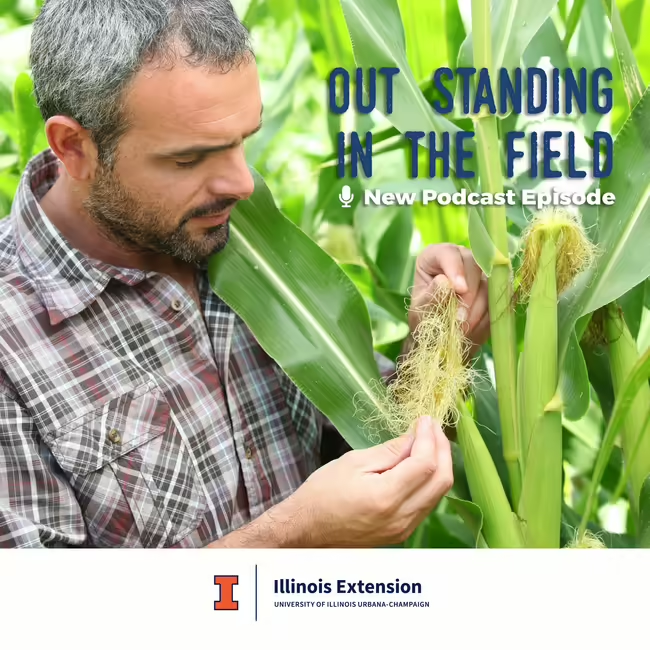
Welcome to outstanding in the field. My name is Doug Gooker. I'm a local food systems and small farms educator here in East Central and Central Illinois, talking about the 2nd week of May, and we've been having very cool temperatures. The end of April, we had warm temperatures. The corn was up.
Doug Gucker: 00:23Probably all the farmers noticed that it was dark green in color. Now that we've had, the 1st 10 days of May have been rather cool. Temperatures have dropped dramatically. Soil temperatures are down near 50 degrees, and the corn is now a nice yellow color, kind of like a yellow sticky note. Why is this?
Doug Gucker: 00:46Is it a nutrient deficiency? No. It is strictly the fact that corn is not very efficient at getting obtaining phosphorus from the soil at cool soil temperatures. When the temperature is below 60 degrees, it just doesn't do very well. And you might say, well, why is that?
Doug Gucker: 01:08Corn is a warm season plant. If you go out right now and if you can find an alfalfa field or a clover field, you'll see it's still bright green even though we've had these cool temperatures. And that's the difference. Cool season plant versus a warm season plant. Even though we plant corn when the ground is pretty cool, and soybeans, they are warm season crops.
Doug Gucker: 01:32And corn just doesn't do quite as well at cool soil temperatures. So don't go out and buy extra sulfur or anything else. We just need the soil temperature to warm up. With that in mind, speaking about cool, we're running about 40 to 50 growing degree units behind normal. And so once again, we got crops in very early.
Doug Gucker: 01:59Everyone thought that the crop was off to a roaring start, and it was. But now we're just basically we're behind normal. And so this is going to be something to kind of keep in mind as we go through, the growing season that we just haven't, as of yet, accumulated near as many, heat units as we typically have. And people are seeing this in all kinds of ways. Vegetable growers are seeing it with tomatoes out in the fields.
Doug Gucker: 02:32Sweet corn isn't progressing quite as well. It's the same thing with our corn and soybean. The next thing I wanna bring up is the fact we've had one heck of a run up in prices for corn and soybeans and wheat. We don't plant much wheat around here. Over the last 6 months, I know hopefully, you've all sold some crop, a portion of the crop for of this year's crop, the 2021 crop, and captured some of these high prices.
Doug Gucker: 03:05But have you considered selling some for 2022? Right now, corn can be sold for full delivery in the fall of 2022 for in the high $4 range, and soybeans can be sold for over $12. That may not seem as much as you could get right now, but just remember the old adage, high prices are the best cure for high prices. Because when prices are high, people, whether it's whether they're feeding livestock or other things, they look for alternative feeds that are lower cost. And right now, the world is feeding wheat.
Doug Gucker: 03:49In fact, in the United States, we're beginning to feed wheat because corn is so expensive. People are now buying, distillers grains instead of soybean meal because it's slightly cheaper, and they can get a little more bang for their buck. And so just keep this in mind. These high prices never last that long. So, I just wanna put that out there for everyone.
Doug Gucker: 04:14Keep that in mind. And one last thing. If you know any high school students, that are interested in agriculture, the University of Illinois, in partnership with Growmark and the Illinois FFA Association is sponsoring the first high school crop scouting competition, and that is going to be on August 4th over at the University of Illinois South Farms. And so this is gonna be a great activity, hoping to attract FFA teams and high school teams to come in and just show, what their expertise is in agronomics and crop scouting. This is something that has been done in a few other states across the nation, and it's about time Illinois does it as well.
Doug Gucker: 05:10So Illinois Extension is taking the lead on this, and so we're gonna have the 1st ever this year, and it's gonna be an annual event from here on out. And, with that in mind, I hope everyone is doing well. Stay safe. And as always, this is Doug Hooker with the University of Illinois Extension, an outstanding in the field.